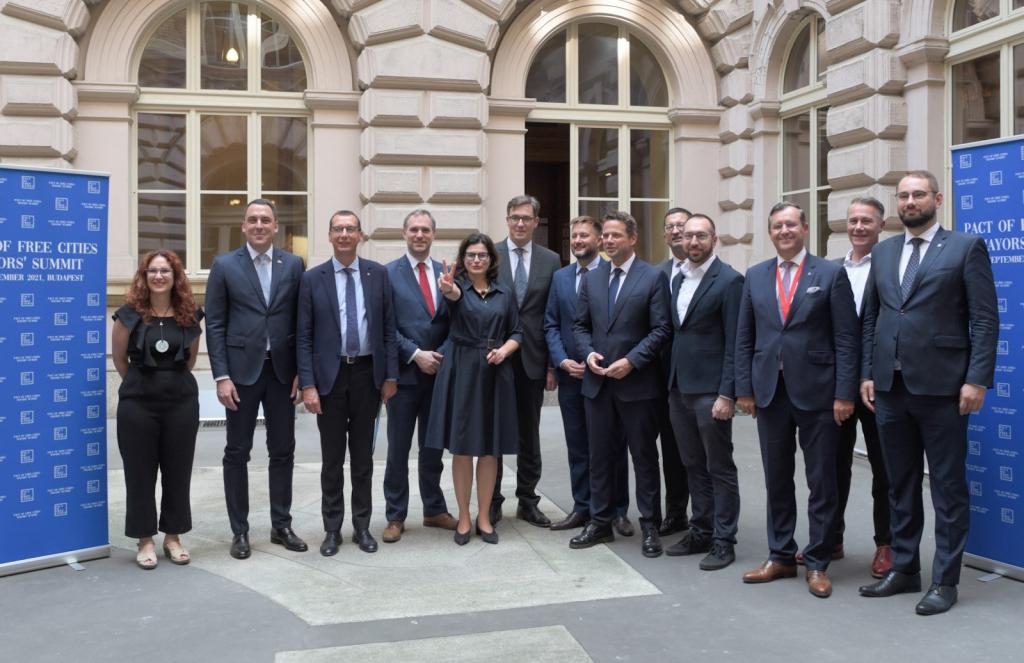Thessaloniki gets ready for its metro launch in November
The underground rapid transit lines have been under construction for almost two decades due to various project delays
 TheMayor.EU logo
TheMayor.EU logo 
Participants in the Pact of Free Cities Mayors' Summit pose ahead of the meeting, Source: Gergely Karácsony on Facebook
On the margins of the conference, 20 new cities have joined the Pact of Free Cities founded by the Visegrad Four capitals
The inaugural Budapest Forum for Building Sustainable Democracies is being held on 16-17 September at the Central European University in the Hungarian capital. The forum organizers - Budapest Municipality, Political Capital, and CEU Democracy Institute, aim to retrieve Budapest’s place on the region's progressive intellectual map, turning the forum into an annual event.
In the opening speech, the Mayor of Budapest Gergely Karácsony drew attention to poverty in democratic societies, which he said is not simply a failure of social policy, but a damage to the credibility of democracy.
The purpose of the conference, which is attended by Hungarian and foreign experts, journalists, activists and policymakers, is to provide a forum for strategic thinking on the cardinal political, social, economic, and environmental transformations affecting Hungary, the wider region and the entire world. Inviting thinkers to formulate innovative and bold ideas, the Forum seeks to find solutions to the challenges, rather than simply keeping an eye on them.
The first edition of the Budapest Forum focuses on cities, local initiatives, and building sustainable democracies.
During the two-day conference, the following topics are covered:
On the margins of the conference, the Pact of Free Cities Mayors’ Summit was also held, where the pact founders expanded the city alliance brought to life in December 2019 by the Visegrad Four capitals.
The meeting at the New Town Hall was attended by 26 cities at the mayoral level, in person or via a video conference connection. The participants adopted a joint statement in which they reconfirmed their commitment to work together for the strengthening of democracy and the rule of law, the implementation of progressive and sustainable urban policies, and against all forms of ideological exclusion.
20 new cities joined the alliance: Amsterdam, Barcelona, Bécs, Gdansk, Frankfurt, Florence, London, Los Angeles, Ljubljana, Neu-Ulm, Paris, Podgorica, Rijeka, Stuttgart, Taipei, Taoyuan, Tirana, Ulm, Vienna, Zagreb.
The Pact of Free Cities is a progressive, open city alliance founded by mayors Gergely Karácsony (Budapest), Matúš Vallo (Bratislava), Rafal Trzaskowski (Warsaw) and Zdeněk Hřib (Prague) on 16 December 2019 in Budapest. The objectives of the association are to protect the values of liberal democracy, pluralism, openness and cultural diversity, to promote better access to European Union resources and to exchange experiences on good urban practices and policies.
Since its launch, the mayors of the Pact of Free Cities have spearheaded an all-European lobbying drive for directly accessible EU-funding. They also reached out to other mayors sharing the same views (e.g. London and Istanbul) to enhance cooperation and progressively expand the network.

The underground rapid transit lines have been under construction for almost two decades due to various project delays

Now you can get your wine in Talence by paying directly in Bitcoin

That’s because the state has to spend money on updating the railway infrastructure rather than subsidizing the cost of the popular pass

Rethinking renewable energy sources for the urban landscape

The examples, compiled by Beyond Fossil Fuels, can inform and inspire communities and entrepreneurs that still feel trepidation at the prospect of energy transition

Now you can get your wine in Talence by paying directly in Bitcoin

The 10th European Conference on Sustainable Cities and Towns (ESCT) sets the stage for stronger cooperation between the EU, national and local level to fast track Europe's transition to climate neutrality.

At least, that’s the promise made by the mayor of Paris, Anne Hidalgo

The underground rapid transit lines have been under construction for almost two decades due to various project delays

At least, that’s the promise made by the mayor of Paris, Anne Hidalgo

Hostal de Pinós is located in the geographical centre of the autonomous region

Despite its church-y name, the district has long been known as the hangout spot for the artsy crowds

Urban dwellers across the EU are having a say in making their surroundings friendlier to people and the environment.

Forests in the EU can help green the European construction industry and bolster a continent-wide push for architectural improvements.

Apply by 10 November and do your part for the transformation of European public spaces

An interview with the Mayor of a Polish city that seeks to reinvent itself

An interview with the newly elected ICLEI President and Mayor of Malmö

A conversation with the Mayor of Lisbon about the spirit and dimensions of innovation present in the Portuguese capital














